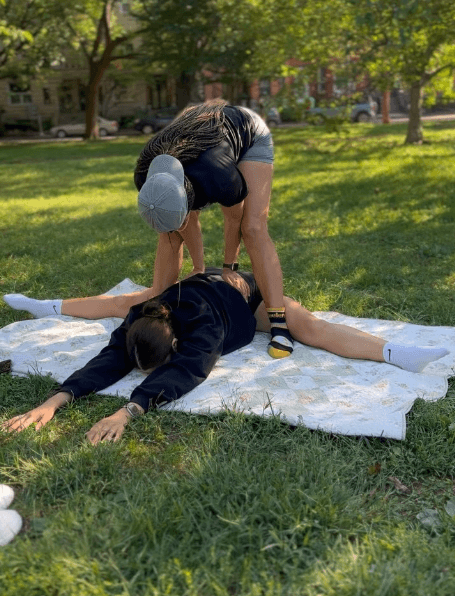A 9-Minute Read
Rest and Recovery are critical to anyone who aims to achieve big things, whether athletically or in life through their business or career.
I know I’ve been on the right path to big things recently because my back has been killing me and I need some rest and recovery…🤣
TLDR: If you didn’t know, a few years ago, I was in a pretty bad car accident that really messed my back up, and recently, MOD was vending at a large event, and all the back-breaking labor inflamed my back injury…
In an effort to come back full force, proper rest and recovery have been on my mind…
In the pursuit of dopeness (i can’t not use it guys lol), you’re bound to push yourself to your limits physically and mentally.
It’s a legit part of the process as a high-achieving person. It’s just the same in lifting weights!
We gotta continue to add more and more weight and reps if we want to get stronger.
And…just like in weight lifting, if you’re constantly pushing without proactive rest and recovery, your body will often force you to take some time off through injury or illness.
I’m sure we’ve all experienced this at one time or another.
If you can achieve it, proper recovery not only enhances athleticism and reduces the risk of injury but also…
Boosts your immune system (helping you stay in the game and be more resilient)…
Increases energy levels (helping you attack life with the proper vigor and excitement)…
And improves mental health (keeping you operating at a high-level day after day)…
and… get this… It can even help you lose weight!
All of these benefits are critical to achieving your maximum potential in any endeavor.
From my research and personal experience, the three pillars of recovery are Sleep, Hydration, and Nutrition, with Active Recovery as an ever-evolving bonus.
Today’s blog is an actionable guide to help you understand each pillar and how to use it to your advantage along your Journey to Dopeness as you work to transform into your best self.
Sleep

Why Sleep’s Important for Rest and Recovery:
Look, I feel you…
Sometimes, you do have to bite the bullet and sacrifice some sleep, but let’s be honest with ourselves: more often than not, cutting the hours you sleep is a secondary effect of sub-par time management, getting distracted, or taking on too many things at once.
Believe me…I know how it is. We’ve all done it.
And honestly, missing a few hours of sleep as a one-off truly won’t hurt things. But it’s when we start sleeping less than we should regularly that we begin to run into issues.
And the best part…it’s often at the WORST time possible that these self-induced issues start to crop up.
Sleep is the bedrock for muscle repair, cognitive function, and overall health.
All the things you like your body doin’ will not be getting done as they should without proper sleep :).
Without enough sleep, the body struggles to repair muscles and regenerate cells, leading to excessively long recovery times and an increased risk of injury.
On the mental front, we all know how it feels when you’re on day 2 or more of subpar sleep, and you have that unshakable mental fog and slowness.
And if you’re trying to show up as your best, sleep deprivation just ain’t it. So, let’s nerd out real quick and get into the science of it all. 🙂
A Peak Behind the Curtain of Sleep and Recovery…How It Works:
In deep sleep stages, your blood flow increases improving delivery of oxygen and nutrients to muscles, aiding in recovery.
Growth hormones are released during non-REM sleep, stimulating muscle repair and growth.
Additionally, the hormone prolactin, which regulates inflammation, is released during sleep…
So, in essence, inadequate sleep prevents critical mechanism in your body, hindering recovery1.
On the cognitive level, certain brain states during sleep help us consolidate the memories and newly learned information from the day before and improve our ability to acquire new information, think critically, and problem-solve2.
Tips to Sleep Like a Log:
- Stick to a sleep schedule:
By going to bed and waking up at the same time every day… even on weekends. This allows your body to develop a sleep-wake cycle that helps you fall asleep faster and stay asleep with fewer interruptions.
- Create a restful environment:
Keep your room cool, dark, and quiet, and limit exposure to electronics 30 minutes before bedtime. If you need to work on your devices in the late evening, using the “Night Light” setting that makes the colors on your device’s screen warmer, which helps to reduce the caffeine-like effects of blue light.
- Limit Daytime Naps:
Limiting naps to 30-60 minutes. Even a 20-minute power nap can help refresh you enough to make it through your day without significantly interrupting your sleep-wake cycle.
- Avoid Caffeine, Alcohol, and Nicotine Before Bed:
These all make it harder to fall asleep. Stopping consumption around 3-4 hours before bed is a great rule of thumb.
- If Possible, Avoid Meals Before Sleep:
Digestion slows when we sleep, so any food we consume will stay in our stomach longer than normal, potentially leading to discomfort or indigestion. Try to keep it to a light snack if you really need it.
Hydration

Why Hydration is Important to Rest and Recovery
The human body is about 60% water! Of course, we need it!
Proper hydration allows your body to handle the stressors we throw at it, both mentally and physically.
A headache is often the most common sign that you’re dehydrated.
Do you often experience random headaches throughout the day?
Next time that happens, think back and see if you’ve been hydrating. If not, start hydrating! It might be all you need, and there is no need to pop any meds.
Hydration also facilitates the bodily processes required to recover a fatigued muscle or brain from a hard training or hard day cognitively.
Basic Science Behind Hydration and Recovery
Dehydration increases heart rate and activates the sympathetic nervous system, leading to elevated stress hormones…
Because of this, hydration impacts Heart Rate Variability (HRV), a measure of the body’s ability to adapt to stress.3
Proper hydration helps maintain healthy HRV levels, ensuring the body can cope with the physical and mental stressors we throw at it!
Additionally, hydration improves blood flow and regulates blood pressure, ensuring oxygen and nutrients are efficiently delivered throughout the body…
This aids in recovery by reducing fatigue and enhancing cognitive performance.
Research shows that even mild dehydration can significantly reduce HRV and overall recovery efficiency4.
How to Hydrate like a Hero
- Start the day off right…and keep it going all day:
Hydration takes time, so it’s best to kick your mornings off with at least a glass of water (give or take, depending on your body…find what amount works best for you).
As the day goes on, it’s best to be proactive and continually aim to stay on top of it instead of waiting until you’re feeling the symptoms. Keeping a water bottle on hand will increase your chances of drinking throughout the day.
- Pre-Exercise:
Drink 17-20 fluid ounces of water 2-3 hours before exercise.
- During Exercise:
If possible, aim to consume 7-10 fluid ounces every 10-20 minutes.
- After exercise:
Rehydrate by drinking around 20-24 fluid ounces
- Monitor Urine Color:
A surefire way to gauge hydration levels, aiming for light-colored urine.
- Electrolytes!
Whether you add one of those fancy hydration packets to a water bottle or the good ole reliable sports drinks like Gatorade or Body Armour, peak hydration is water + electrolytes. Bonus: Coconut water is another great option, too!
Nutrition

Why Nutrition is Important for Rest and Recovery
You truly are what you eat!
Every muscle fiber you build, every wonderful idea you have, and every action you take is fueled by the food you put in your body.
You simply cannot build a better you without giving your body and mind the proper blocks to build from.
How It Works… Scientifically Speaking
During exercise, muscles consume glycogen and protein.
Post-exercise nutrition helps rebuild those glycogen stores and repair muscle proteins.
Protein provides the amino acids needed for muscle repair5, while carbohydrates replenish glycogen stores6.
So, consuming carbs and protein together is the double whammy to maximize recovery
Cognitively, the brain consumes around 500 calories per day7.
To put it into perspective, for the average person, that’s around 20% of the body’s total energy despite only being 2% of the body’s weight.
So without enough proper fuel you’ll starve not just your body, but your brain!
How to Nutrition for Your Rest and Recovery Mission
- Balance and Timing:
Eat a meal containing protein and carbs to recover both the muscles and the glycogen stores after a workout.
- Continual Feeding:
Unless you follow some sort of fasting protocol, aiming for 20-40 grams of protein every 3-4 hours throughout the day is a great trickle feed to allow your body to rebuild optimally.
- Preworkout…Meals!
A few hours before exercise or strenuous activity, fuel up with a good mix of protein and carbs. Light meals are recommended so you don’t feel overly full while in action. Even after exercise, the effects of a good prework meal are invaluable!
- Plan Ahead!
Planning and prepping your meals ahead of time makes it so much easier to make better food choices when you’re in a rush or super hungry post-workout! If you want some help ensuring your meals are nutritious, filling, and delicious, we can help with that! Check out this week’s menu to grab your next set of pre-and post-workout meals!
Bonus Section: Active Recovery
Deserving its own post, this is just a brief overview of some of my favorite active recovery methods!
Walking, stretching/yoga, spending time in nature, meditation, and non-strenuous social activities are essential for reducing muscle stiffness, enhancing flexibility, and promoting mental relaxation.

These activities help to physically maintain blood flow to muscles, reducing soreness and speeding up recovery.
They also give your mind a calm cognitive reset, allowing your subconscious mind to perform the processes it’s great at!
Let’s get it! (“it” being Rest and Recovery!)
Pursuing our best selves is not only about the tasks we accomplish or the training we do but also about the time we spend not thinking about work and not on the field.
The more effectively you can rest and recover from your hard work, the quicker you can get back out there kicking ass and taking names in whatever it is you’re chasing!
Remember, the most important part is actually using the tips and strategies!
Reading the blog is nice, but actually going out there, implementing this new information, and testing to see what works best for you is invaluable!
Share your experiences and maybe any rest and recovery tips you’ve picked up along your journey to dopeness!
If you have any questions about how to best recover in your situation, leave a comment, and I’ll respond!
Stay Healthy, Stay Dope
Relevant Readings:
- How to Eat More & Still Lose Weight [Infographic on Calorie-Dense Foods]
- More than Meal Prep: Boost Your Health & Wealth with Wisdom from a Latina Bodybuilding & Business Pro
- Motivate Your Weight Loss Journey with a Fun Perspective Twist [16 Examples!]
- 5-Simple Steps to Weight Loss that You can Start TODAY [Actionable List]
Citations:

Leave a Reply
You must be logged in to post a comment.